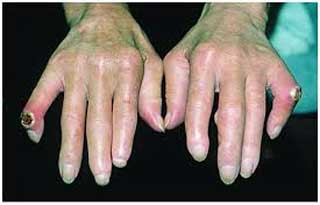- Home
- Editorial
- News
- Practice Guidelines
- Anesthesiology Guidelines
- Cancer Guidelines
- Cardiac Sciences Guidelines
- Critical Care Guidelines
- Dentistry Guidelines
- Dermatology Guidelines
- Diabetes and Endo Guidelines
- Diagnostics Guidelines
- ENT Guidelines
- Featured Practice Guidelines
- Gastroenterology Guidelines
- Geriatrics Guidelines
- Medicine Guidelines
- Nephrology Guidelines
- Neurosciences Guidelines
- Obs and Gynae Guidelines
- Ophthalmology Guidelines
- Orthopaedics Guidelines
- Paediatrics Guidelines
- Psychiatry Guidelines
- Pulmonology Guidelines
- Radiology Guidelines
- Surgery Guidelines
- Urology Guidelines
Clinical Dilemma : Scleroderma and Lupus overlap presenting as Renal Failure

Dr Rathindranath Sarkar Professor and HOD Dept. of Medicine, Medical College, Kolkata, West Bengal and colleagues have reported an unusual case of Sudden Renal Failure in a Scleroderma Patient due to overlapping lupus. The case has appeared in Journal of Association of Physicians of India.
Scleroderma is a connectivDr Rathindranath Sarkar Professor and HOD Dept. of Medicine, Medical College, Kolkata, West Bengal and colleagues have reported an unusual case of Sudden Renal Failure in a Scleroderma Patient due to overlapping lupuse tissue disease which may present with a renal crisis. But sometimes, acute renal failure in scleroderma may be due to a second pathology.
A 35-year-old woman was admitted with rapidly progressive dyspnea and anasarca for 15 days. She had progressive oliguria and at the time of admission, her urine output was 200 ml/day. She also had intermittent fever and arthritis of small joints. In the past, this woman had been diagnosed with diffuse systemic sclerosis (dSSC) but except for NSAIDs for her arthritis, she was not receiving any therapy. She had had occasional episodes of Raynaud’s phenomena but did not take any treatment for it. At the time of admission, she was receiving some herbal treatment.
On examination, the patient was found to have a pulse rate of 120/minute and blood pressure of 180/96 mm of Hg in both the arms. Her hands showed digital gangrene with pseudoclubbing and there was skin tightening in the face . She had mild pallor, pedal oedema and generalized muscle tenderness. The respiratory rate was 32/minute and SaO2 was 95% in room air. Examination of the thorax revealed decreased breath sound with percussion dullness in right lower zone, suggestive of pleural effusion.
Her Routine urine examination showed protein 2+, plenty of WBCs/hpf and 8-10 RBCs/hpf; there were no casts or crystals. Ultrasonography of kidneys showed only mild intra-renal edema. Repeat serological tests showed AntiNuclear factor to be positive (1:640) with a speckled pattern and Anti-Scl-70 to be moderately positive.
Diagnosed as a case of scleroderma renal crisis, the patient was started on ACE inhibitors (Enalapril 5 mg BD) and calcium channel blockers for hypertension. The condition however continued to deteriorate and on the 3rd day, she had complete anuria with severe anasarca. The urea/ creatinine on day 3 was 196/4 mg/ dl respectively. She was started on hemodialysis.
She developed some cutaneous vasculitic lesions on the 4th day and her urine also had active sediments.
Finally, serology and kidney biopsy established the renal lesion as stage IV lupus nephritis. She responded to the immunosuppressive regimen for lupus with rapid improvement of kidney function. Such overlap of scleroderma with lupus is very rarely reported.
Scleroderma (SSC) can sometimes have overlap with other connective tissue disorders, Rheumatoid Arthritis, Sjogren's syndrome and myositis have been reported to overlap with SSC.3 Overlap with SLE is comparatively rare.3 The autoantibodies found in SSC, like Scl-70, may also appear in other connective tissue disorders like SLE.3 Hence, only the presence of autoantibodies is not a definitive proof of the presence of a particular CTD. Therefore proper clinical features must also be present for diagnosis.
For further reference log on to :
http://www.japi.org/august_2018/23_CR_Sudden%20Renal%20Failure%20in%20a%20Scleroderma.html

Disclaimer: This site is primarily intended for healthcare professionals. Any content/information on this website does not replace the advice of medical and/or health professionals and should not be construed as medical/diagnostic advice/endorsement or prescription. Use of this site is subject to our terms of use, privacy policy, advertisement policy. © 2020 Minerva Medical Treatment Pvt Ltd